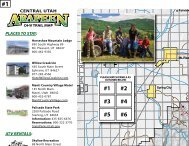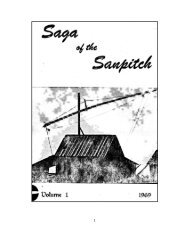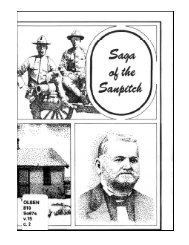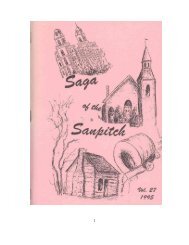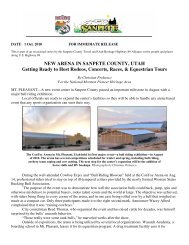Saga of the Sanpitch Volume 13, 1981 - Sanpete County
Saga of the Sanpitch Volume 13, 1981 - Sanpete County
Saga of the Sanpitch Volume 13, 1981 - Sanpete County
- TAGS
- saga
- sanpitch
- volume
- sanpete
- sanpete.com
You also want an ePaper? Increase the reach of your titles
YUMPU automatically turns print PDFs into web optimized ePapers that Google loves.
"Sarah Fat' seemed well deserved or, at <strong>the</strong> least, descriptive. I looked at my skinny arms and <strong>the</strong>n at hers, and<br />
wondered about growing up. Intimidation must have a great deal to do with size.<br />
It was Sarah's music class, however, that left its mark in my nervous system. She loved to sing, and she<br />
liked boys and girls who could sing. My introduction to <strong>the</strong> mysteries <strong>of</strong> two-part harmony began when she<br />
divided <strong>the</strong> class into two groups, which she called Bluebirds and Robins. A special class for Canaries, <strong>the</strong><br />
fortunate few who could sing a solo part, was for a future time.<br />
Sarah's ability to divide <strong>the</strong> class into Bluebirds and Robins was demonstrated with <strong>the</strong> precision <strong>of</strong> an<br />
electronic computer. With a dispatch that brooked no middle ground, she assigned <strong>the</strong> students here or <strong>the</strong>re<br />
as befitted <strong>the</strong>ir talents as 'Bluebird' or 'Robin.' Indeed, <strong>the</strong> feeling came over me that one <strong>of</strong> life's desirable<br />
goals was to be one <strong>of</strong> Sarah's Song Birds. But to my dismay <strong>the</strong>re were two <strong>of</strong> us left over. With a thumb<br />
under her chin she mused - we were certainly not Bluebirds, nor Robins. In a flash she had it - we were Crows!<br />
Her announcement <strong>of</strong> this new group increased my bewilderment. How could she use <strong>the</strong> raucous squawk <strong>of</strong> a<br />
crow in a song? The answer was not long in coming. After arranging <strong>the</strong> Bluebirds and Robins in appropriate<br />
positions, she pointed a reproachful finger at <strong>the</strong> door. "The Crows will go out into <strong>the</strong> hall and close <strong>the</strong> door<br />
until <strong>the</strong> class is over."<br />
Now, I have no quarrel with letting <strong>the</strong> punishment fit <strong>the</strong> crime, but in this case it did not serve as a<br />
remedy. I am still a Crow!<br />
A SIGHT TO BEHOLD<br />
Elizabeth Jacobsen Story<br />
15<strong>13</strong> Madison Avenue<br />
Cheyenne, Wyoming 82001<br />
Non-Pr<strong>of</strong>essional Division, Honorable Mention Anecdote<br />
In <strong>the</strong> early days before <strong>the</strong> turn <strong>of</strong> <strong>the</strong> century and up until 1903, <strong>the</strong> sheep owners and cattle owners<br />
<strong>of</strong> <strong>Sanpete</strong> could graze <strong>the</strong>ir flocks <strong>of</strong> sheep or <strong>the</strong>ir herds <strong>of</strong> cattle on <strong>the</strong> Wasatch Plateau east <strong>of</strong> <strong>Sanpete</strong><br />
<strong>County</strong> absolutely free. Then in <strong>the</strong> winter <strong>the</strong>y would move <strong>the</strong> herds down from <strong>the</strong> mountain pastures to<br />
<strong>the</strong> East Desert — or to <strong>the</strong> West Desert. The West Desert was Jericho where most <strong>of</strong> <strong>the</strong> Mt. Pleasant<br />
livestock were taken. The sheep were herded by young men from Mt. Pleasant, some <strong>of</strong> whose families<br />
owned <strong>the</strong> livestock. It was a pleasant job for a young man to spend his summer on <strong>the</strong> mountain and to have<br />
his own horse and sheep-camp wagon, with a white canvas cover for his shelter and, inside, a stove and table<br />
and bed.<br />
Each herder had his sheep dogs to help him control <strong>the</strong> herd. In <strong>the</strong> morning <strong>the</strong>re was much work to<br />
be done and also in <strong>the</strong> evening to get <strong>the</strong>ir herds bedded down for night time, but in <strong>the</strong> afternoon <strong>the</strong>re was<br />
time for <strong>the</strong> herder to spend as he pleased while <strong>the</strong> sheep were resting in <strong>the</strong> shade <strong>of</strong> <strong>the</strong> trees. Some boys<br />
rode <strong>the</strong>ir horses, some rested and some spent hours foolishly carving names on <strong>the</strong> lovely white barked<br />
Aspen trees with <strong>the</strong>ir pocket knives; but <strong>the</strong>re was one boy from Mt. Pleasant who did not waste his time or<br />
talent. Each afternoon he got out his paints, brushes and turpentine and painted lovely things — birds, trees,<br />
horses, small animals and his dogs and sheep and <strong>the</strong> lovely mountains and streams. Then at <strong>the</strong> end <strong>of</strong> <strong>the</strong><br />
summer when it was time to bring <strong>the</strong> herds west to Mt. Pleasant and over to <strong>the</strong> West Desert, <strong>the</strong>y all came<br />
with <strong>the</strong>ir sheep-camp wagons down to <strong>the</strong> valley.<br />
Some wagons and herders were not needed on <strong>the</strong> Desert. Many <strong>of</strong> <strong>the</strong> camps were left in Mt.<br />
Pleasant until needed again in <strong>the</strong> springtime <strong>the</strong> next year.<br />
54



